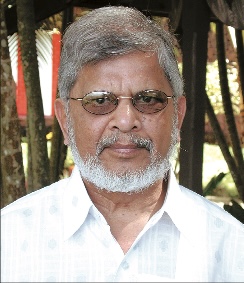By Arun Gandhi
In our obscurantist zeal we focus on a crisis with-out going into the cause and inevitably reach wrong conclusions. If a doctor diagnosed a patient from superficial symptoms, he/she may cure the boil, but not the ailment. Hindus look today at what happened in India and blame the Muslims for the riots. But the fact is that for several months, if not years, Hindus have been fanning the flames of dissension and communalism in the country. In this volatile atmosphere, when kar sevaks returning from Ayodhya taunted Muslim vendors at Dahod railway station, pulled their beards and ransacked their stalls, they ignited a conflagration that even they could not control. This senseless and aggressive act was repeated by the kar sevaks at Godhra station where a senior Muslim vendor was physically attacked.
In my opinion, neither the Vishwa Hindu Parishad nor the RSS is really interested in rebuilding the temple in Ayodhya. The issue has been used for political gimmickry. If rebuilding the temple was all that important, the Hindus and Muslims of Ayodhya would have eagerly cooperated so that they, too, could rebuild their economy and begin to live a normal life. Instead, Ayodhya became the nexus which the Bharatiya Janata Party and its allies sought to exploit the Hindu vote so that a Hindu government could be installed in New Delhi, just as the Congress Party exploited the Muslim and Harijan votes while they were in power.
The BJP dropped the temple issue, just as the Congress dropped the Muslim and Harijan issues after each election. Both the Congress and the BJP revisit their pet issues only when they see the need for the Indian community to be divided. This is what Gandhiji condemned as “Politics without Principles,” while the British called it “Divide and Rule.”
It is now convenient for all to blame Gandhiji for the ills of their own misdeeds. Gandhiji did not want the partition of India, but the Congress Party was so eager to get into positions of power that they ignored Gandhiji’s warnings and negotiated with the British to divide the country. The ensuing holocaust was shrugged off as the price for independence. But Gandhiji cared for the lives of people, because he did not see them as Hindus or Muslims but as human beings. At the crucial period in the independence movement, and at other times, the RSS vitiated the communal atmosphere in the country by demanding a Hindu India. They exacerbated the insecurity that the Muslim minority felt. No one except Gandhiji recognized the fact then, and no one does even now, that India is a multi-religious society, and that it can live in peace only if we respect each other. Respect can never come from fear. It can only come from love and understanding and compassion, the cardinal principles on which Hinduism is built.
There are more than 120 million Muslims in India today, not to mention the Christians and Buddhists and scores of other religious groups. To create a Hindu India, we have the option of throwing all of them out of the country, which is not practical because it is impossible to achieve. Besides, what if other countries throw Hindus out in retaliation, as they did in Uganda? The other option, equally absurd, is to kill all non-Hindus and face the opprobrium of the world. I propose we consider the civilized Gandhian option of learning to respect each other and coexist in peace and harmony.
If one can accept the ridiculous notion that the very survival of Hinduism is at stake, then we must understand this threat is not because Muslims and Christians are killing us but because they are converting and offering respectability to 150 million Harijans whom we continue to oppress and exploit. If we refuse to clean up our house, then we are responsible for the dirt and disease, not others.
No one, not even Gandhiji, ever advised Hindus to be meek and submissive in the face of real injustice. Gandhiji always stood up for injustice anywhere and willingly suffered the consequences. What Gandhiji tried to teach the world is to look for solutions, not for revenge. Solutions can be found only when we refuse to succumb to anger. When angry, we are not in control of our minds, and that means we have no control over our actions. This attitude creates a vicious atmosphere and makes a viable solution impossible. It is only when we learn to channel anger as we channel electricity, with respect and intelligence, that we will be able to use the energy for humanity’s good rather than its destruction.
It is interesting that in the very city of Ahmedabad, where such inhuman atrocities were committed in the name of Lord Rama, there is a sprawling slum called “Ram-Rahim Nagar,” where Hindus and Muslims live in peace and harmony, even as the rest of the city burned. When interviewed by the New York Times, residents both Hindu and Muslim said the common bond of poverty gave rise to a brotherhood among them that will never be destroyed by politics. There are times when the most ignorant and the most challenged among us show greater wisdom and sensitivity than the so-called educated and advanced.
Hinduism has survived the ravages of thousands of years in spite of its own inherent weaknesses. Hinduism has also attracted many invasions over the centuries because of its belief in peace and nonviolence. It has survived because it is so tolerant, inclusive, accepting and forgiving. It will survive the modern madness of blood-thirsty protectors who are as ignorant of their religious beliefs as they are of their values. May God have mercy on human exploiters.
Arun Gandhi, 68, is the grandson of Mahatma Gandhi. He and his wife Sunanda founded the M. K. Gandhi Institute for Nonviolence (www.gandhiinstitute.org) in 1991. E-mail:gandhi@cbu.edu.
